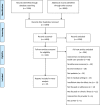Health care provider-delivered adherence promotion interventions: a meta-analysis
- PMID: 24799545
- PMCID: PMC4035593
- DOI: 10.1542/peds.2013-3639
Health care provider-delivered adherence promotion interventions: a meta-analysis
Abstract
Background and objective: Improving medical regimen adherence is essential for maximizing the therapeutic potential of treatments for pediatric chronic illness. Health care providers are uniquely positioned to deliver adherence promotion interventions. However, no studies have summarized the effectiveness of health care provider-delivered adherence interventions. The objective of this study was to describe the effectiveness of health care provider-delivered adherence promotion interventions in improving adherence among children who have chronic illness. Data sources include PubMed, PsycINFO, CINAHL, and Scopus. Studies were included if they were randomized-controlled trials of pediatric interventions aiming to increase adherence to the primary regimen for a chronic illness and at least 1 health care provider delivered the intervention.
Results: A total of 35 randomized-controlled studies including 4616 children were included. Greater improvements in adherence were observed immediately after health care provider-delivered interventions (d = 0.49; 95% confidence interval, 0.32 to 0.66) than at longer-term follow-up (d = 0.32; 95% confidence interval, 0.10 to 0.54). Treatment effect sizes differed across the adherence behaviors measured. There was significant heterogeneity in treatment effects; however, no moderators of treatment effectiveness were identified. This meta-analysis focused on the published literature. In addition, the majority of studies involved children who had asthma and younger children.
Conclusions: Health care provider-delivered interventions for children who have chronic illness can be effective in improving adherence. Gains in adherence are highest immediately after intervention. Future interventions and studies should include multiple methods of assessing adherence, include active comparators, and address long-term maintenance of adherence gains.
Keywords: chronic disease; health personnel; medication adherence; patient compliance; pediatrics; self care.
Copyright © 2014 by the American Academy of Pediatrics.
Figures
Similar articles
-
Promoting and supporting self-management for adults living in the community with physical chronic illness: A systematic review of the effectiveness and meaningfulness of the patient-practitioner encounter.JBI Libr Syst Rev. 2009;7(13):492-582. doi: 10.11124/01938924-200907130-00001. JBI Libr Syst Rev. 2009. PMID: 27819974
-
Beyond the black stump: rapid reviews of health research issues affecting regional, rural and remote Australia.Med J Aust. 2020 Dec;213 Suppl 11:S3-S32.e1. doi: 10.5694/mja2.50881. Med J Aust. 2020. PMID: 33314144
-
Strategies of adherence promotion in the management of pediatric chronic conditions.J Dev Behav Pediatr. 2013 Nov-Dec;34(9):716-29. doi: 10.1097/DBP.0b013e31829f6781. J Dev Behav Pediatr. 2013. PMID: 24247913 Review.
-
Physician behavior in the care of pediatric chronic illness: association with health outcomes and treatment adherence.J Dev Behav Pediatr. 2009 Jun;30(3):246-54. doi: 10.1097/DBP.0b013e3181a7ed42. J Dev Behav Pediatr. 2009. PMID: 19525719 Review.
-
Interventions to Promote Oral Medication Adherence in the Pediatric Chronic Illness Population: A Systematic Review From the Children's Oncology Group.J Pediatr Oncol Nurs. 2019 May/Jun;36(3):219-235. doi: 10.1177/1043454219835451. Epub 2019 Apr 4. J Pediatr Oncol Nurs. 2019. PMID: 30943831 Free PMC article.
Cited by
-
Designing an App for Immunosuppression Adherence and Communication: A Qualitative Approach.Can J Kidney Health Dis. 2022 Jan 31;9:20543581211072330. doi: 10.1177/20543581211072330. eCollection 2022. Can J Kidney Health Dis. 2022. PMID: 35127106 Free PMC article.
-
Small Interventions for Big Change: Brief Strategies for Distress and Self-Management Amongst Youth with Type 1 Diabetes.Curr Diab Rep. 2020 Jan 30;20(1):3. doi: 10.1007/s11892-020-1290-7. Curr Diab Rep. 2020. PMID: 32002682 Free PMC article. Review.
-
Adherence and barriers to hyperinsufflation in children with congenital muscular dystrophy.Pediatr Pulmonol. 2017 Jul;52(7):939-945. doi: 10.1002/ppul.23645. Epub 2016 Nov 22. Pediatr Pulmonol. 2017. PMID: 27875025 Free PMC article. Clinical Trial.
-
Improving medication adherence in migraine treatment.Curr Pain Headache Rep. 2015 Jun;19(6):24. doi: 10.1007/s11916-015-0498-8. Curr Pain Headache Rep. 2015. PMID: 26040703 Review.
-
Antibiotic Prophylaxis for Children With Sickle Cell Anemia.Pediatrics. 2018 Mar;141(3):e20172182. doi: 10.1542/peds.2017-2182. Epub 2018 Feb 5. Pediatrics. 2018. PMID: 29437860 Free PMC article.
References
-
- Rapoff M. Adherence to Pediatric Medical Regimens. 2nd ed. New York: Springer Science+Business Media; 2010
-
- World Health Organization Adherence to Long-Term Therapies: Evidence for Action. World Health Organization; 2003. Available at: http://whqlibdoc.who.int/publications/2003/9241545992.pdf. Accessed April 9, 2014
-
- Graves M, Roberts M, Rapoff M, Boyer A. The efficacy of adherence interventions for chronically ill children: a meta-analytic review. J Pediatr Psychol. 2010;35(4):368–382 - PubMed
-
- Kahana S, Drotar D, Frazier T. Meta-analysis of psychological interventions to promote adherence to treatment in pediatric chronic health conditions. J Pediatr Psychol. 2008;33(6):590–611 - PubMed
-
- Kripalani S, Yao X, Haynes R. Interventions to enhance medication adherence in chronic medical conditions: a systematic review. Arch Intern Med. 2007;167(6):540–550 - PubMed
Publication types
MeSH terms
Grants and funding
LinkOut - more resources
Full Text Sources
Other Literature Sources
Medical



